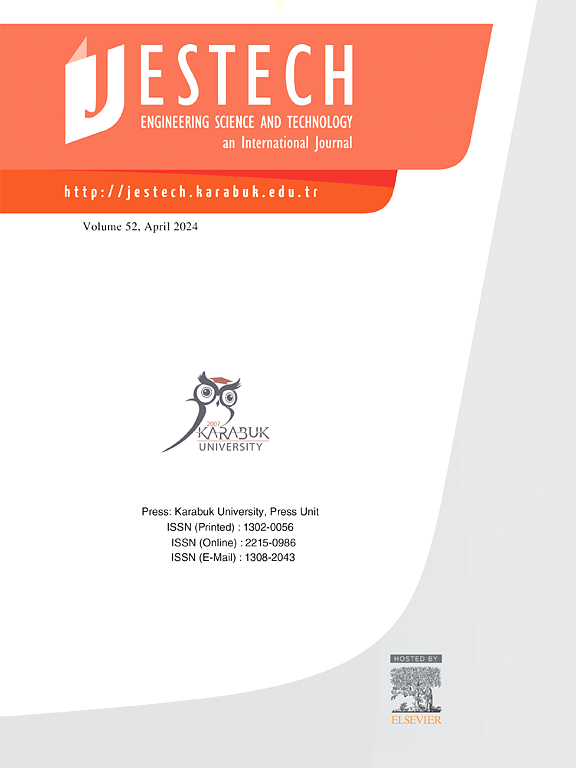A review of artificial intelligence techniques for optimizing friction stir welding processes and predicting mechanical properties
IF 5.1
2区 工程技术
Q1 ENGINEERING, MULTIDISCIPLINARY
Engineering Science and Technology-An International Journal-Jestech
Pub Date : 2025-02-01
DOI:10.1016/j.jestch.2025.101949
引用次数: 0
Abstract
The implementation of artificial intelligence (AI) has been instrumental in the optimization of friction stir welding (FSW) parameters. Artificial intelligence (AI) techniques, including artificial neural networks (ANN) and adaptive neuro-fuzzy inference systems (ANFIS), were utilized to predict mechanical properties such as ultimate tensile strength (UTS) and optimize pivotal welding parameters, such as rotational speed, feed rate, axial force, and tilt angle. These methodologies enabled precise real-time control, thus improving the quality and consistency of the resulting welded joints. The objective of this study was to conduct a comprehensive review of the application of artificial intelligence (AI) techniques in friction stir welding (FSW). The objective of the study was to synthesize existing research using AI to predict mechanical properties and optimize welding parameters. Furthermore, the study aimed to illustrate how artificial intelligence has improved the caliber and dependability of FSW joints through real-time observation and defect identification. A systematic literature review was conducted according to the PRISMA guidelines to identify relevant studies on the utilization of AI in FSW. A search algorithm was applied to databases such as ScienceDirect and Web of Science, resulting in the identification of 27 relevant scientific papers. The selection criteria were designed to identify studies that employed AI techniques for the prediction and optimization of FSW parameters. The principal findings indicated the pervasive deployment of 34 distinct AI techniques, with ANN being the most prevalent. Hybrid models combining AI with optimization algorithms, such as particle swarm optimization (PSO) and genetic algorithms, were particularly effective. These models demonstrated high precision in predicting tensile strength and detecting internal defects, significantly improving joint quality. In conclusion, AI applications in FSW have proven essential for optimizing welding processes, with hybrid AI models showing superior performance. The continued integration of AI in FSW is expected to enhance the efficiency and reliability of welding operations, offering significant industrial advantages.
搅拌摩擦焊接工艺优化及力学性能预测的人工智能技术综述
人工智能(AI)的应用对搅拌摩擦焊(FSW)参数的优化具有重要意义。利用人工智能(AI)技术,包括人工神经网络(ANN)和自适应神经模糊推理系统(ANFIS),预测极限抗拉强度(UTS)等力学性能,并优化关键焊接参数,如转速、进给速率、轴向力和倾斜角。这些方法实现了精确的实时控制,从而提高了焊接接头的质量和一致性。本研究的目的是对人工智能(AI)技术在搅拌摩擦焊(FSW)中的应用进行全面综述。该研究的目的是综合现有研究,利用人工智能预测力学性能并优化焊接参数。此外,该研究旨在说明人工智能如何通过实时观察和缺陷识别来提高FSW关节的口径和可靠性。根据PRISMA指南进行了系统的文献综述,以识别人工智能在FSW中的应用的相关研究。在ScienceDirect和Web of Science等数据库中应用搜索算法,识别出27篇相关的科学论文。选择标准旨在确定采用人工智能技术预测和优化FSW参数的研究。主要研究结果表明,34种不同的人工智能技术得到了广泛应用,其中人工神经网络最为普遍。将人工智能与优化算法(如粒子群优化(PSO)和遗传算法)相结合的混合模型尤其有效。这些模型在预测抗拉强度和检测内部缺陷方面具有较高的精度,显著提高了接头质量。总之,人工智能在焊接焊接中的应用对于优化焊接工艺至关重要,混合人工智能模型表现出卓越的性能。人工智能在焊接焊接中的持续集成有望提高焊接操作的效率和可靠性,从而提供显着的工业优势。
本文章由计算机程序翻译,如有差异,请以英文原文为准。
求助全文
约1分钟内获得全文
求助全文
来源期刊

Engineering Science and Technology-An International Journal-Jestech
Materials Science-Electronic, Optical and Magnetic Materials
CiteScore
11.20
自引率
3.50%
发文量
153
审稿时长
22 days
期刊介绍:
Engineering Science and Technology, an International Journal (JESTECH) (formerly Technology), a peer-reviewed quarterly engineering journal, publishes both theoretical and experimental high quality papers of permanent interest, not previously published in journals, in the field of engineering and applied science which aims to promote the theory and practice of technology and engineering. In addition to peer-reviewed original research papers, the Editorial Board welcomes original research reports, state-of-the-art reviews and communications in the broadly defined field of engineering science and technology.
The scope of JESTECH includes a wide spectrum of subjects including:
-Electrical/Electronics and Computer Engineering (Biomedical Engineering and Instrumentation; Coding, Cryptography, and Information Protection; Communications, Networks, Mobile Computing and Distributed Systems; Compilers and Operating Systems; Computer Architecture, Parallel Processing, and Dependability; Computer Vision and Robotics; Control Theory; Electromagnetic Waves, Microwave Techniques and Antennas; Embedded Systems; Integrated Circuits, VLSI Design, Testing, and CAD; Microelectromechanical Systems; Microelectronics, and Electronic Devices and Circuits; Power, Energy and Energy Conversion Systems; Signal, Image, and Speech Processing)
-Mechanical and Civil Engineering (Automotive Technologies; Biomechanics; Construction Materials; Design and Manufacturing; Dynamics and Control; Energy Generation, Utilization, Conversion, and Storage; Fluid Mechanics and Hydraulics; Heat and Mass Transfer; Micro-Nano Sciences; Renewable and Sustainable Energy Technologies; Robotics and Mechatronics; Solid Mechanics and Structure; Thermal Sciences)
-Metallurgical and Materials Engineering (Advanced Materials Science; Biomaterials; Ceramic and Inorgnanic Materials; Electronic-Magnetic Materials; Energy and Environment; Materials Characterizastion; Metallurgy; Polymers and Nanocomposites)
 求助内容:
求助内容: 应助结果提醒方式:
应助结果提醒方式:


